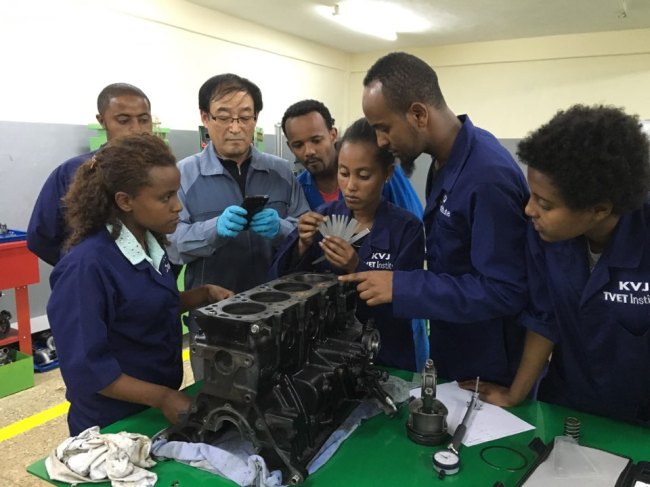Korea looks to give back to Ethiopia for Korean War service
More than 60 years ago, Kostle flew thousands of kilometers away from his homeland to fight in the Korean War while serving as a young bodyguard of the Ethiopian Emperor Haile Selassie.
Until he passed away a year ago after suffering a stroke, he vividly remembered the snowy winter during which the whole world turned sheer white, and how he had developed skills to fix telephone lines amid the chaos. In one heartwarming episode recounted to his son, he gave his rations to other hungry soldiers. 
Kostle was lucky enough to avoid serious injury during the conflict. Albeit not in the snow-white season, he had the chance to see Seoul again in 2010 as part of the Ministry of Patriots and Veterans Affairs’ “Revisit Korea” program for overseas veterans to mark the 60th anniversary of the war.
His son, the 26-year-old Fitsum, is currently receiving mechanic education at a vocational school jointly set up in Addis Ababa by the Korea International Cooperation Agency and the Korea Chamber of Commerce & Industry.
Initiated in 2011, the project is designed to provide the offspring of Ethiopian veterans with job training based on Korean expertise and teaching materials. Its first class of 80 students took an eight-month course in Korea. Fitsum is part of the 60-strong third batch who are being trained at the Korean Veterans Juniors TVET (technical and vocational education and training) Institute located within the campus of the Entoto TVET College. The enrollees’ average age is between 26 and 27.
After the armistice, the elite soldiers returned home. But many of them, having faced persecution under the communist regime that seized control following a coup in the 1970s, were left to live on meager incomes and insufficient treatment for their wounds.
During a visit on May 4, the institution brimmed with the sounds of various machines and woodcraft tools across its six departments -- automotive, welding and plumbing, construction, electricity, garment and computer.
Garment students were vying with one another to make nicer skirts, while Fitsum and other automotive majors were wrestling with cylinders to prevent engine vacuum leaks of a brand new Sonata, with the support of Korean instructors, mostly retired vocational training experts.
As many students dream of opening their own business just like Fitsum, the college offers lessons on applying for state start-up funds, Choi noted, adding that the Ethiopian government provides 80 percent of the foundation costs of the approved proposals.
Throughout the one-year period excluding a two-month vacation, the trainees get a monthly allowance of $180 -- $80 is doled out in cash and the remainder deposited to be given as start-up capital upon graduation.
The school also helps students land jobs after graduation, cashing in on its academia-industry partnerships with nine local companies.
In Bole, on the outskirts of Addis Ababa, KOICA runs another TVET college in collaboration with electronic giant LG and World Together, a Korean nongovernment organization.
LG-KOICA Hope TVET College, which opened in November 2014, now involves 225 young Ethiopians including the children of Korean War veterans, and three exchange students as teaching assistants from Yonam Institute of Digital Technology in Jinju, South Gyeongsang Province. Its curriculum includes academic studies and field training focusing on information and communications technology, electronic appliances and electrical engineering.
Biruk Ayalew, a 23-year-old electronics major, joined the school following his family’s suggestion. His father, who also served in Korea, died 20 years ago, and now his son is learning more about the country as member of a cultural exchange club.
He regrets missing a chance to visit Korea while studying engineering at Dire Dawa University and expressed interest in Korean language and culture, as well as technological advancement.
The college’s students only pay a fraction of the tuitions of other institutions but their performance has been excellent even compared with other TVETs funded by countries such as Germany, Sweden and Austria, its Dean Dereje Wondimalem said.
An average of 98.5 percent of the trainees pass national competence assessment exams, he noted, whereas the overall nationwide rate hovers at around 60 percent.
Source: The Korea Herald
